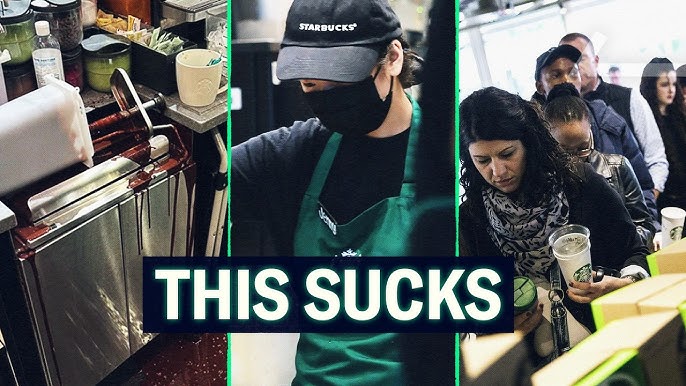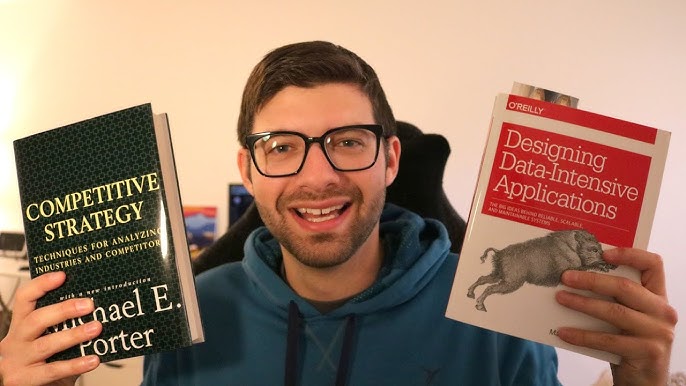
Why Starbucks Sucks Now
More Perfect Union
106,869 views • 15 hours ago
Video Summary
Starbucks, once a beloved "third place" and socially conscious corporation, is now facing widespread criticism, boycotts, and strikes due to a perceived decline in quality and customer experience driven by corporate greed. A shift in focus from baristas and consumers to shareholders following the 2008 financial crisis led to an emphasis on expansion, automation, and pick-up-only stores, eroding the original concept of community spaces. This strategic pivot, coupled with a series of controversial policies and product changes, has alienated customers and frustrated employees, who have been organizing and unionizing in response. The company's attempts to address these issues have often been characterized as "band-aid fixes," with new CEOs implementing costly, sometimes ill-conceived, turnaround plans that have failed to improve the situation or adequately address worker concerns, leading to significant stock price and sales declines.
The company's current leadership, under CEO Brian Nickel, has seen further price increases, restricted loyalty rewards, and a move away from community-friendly practices like offering free water and bathroom access. Despite claiming to aim for a return to the company's "soul," implemented policies have exacerbated understaffing, created unsafe working conditions, and stifled worker creativity and morale, all while negotiations with the union have stalled. In an effort to circumvent collective bargaining, Starbucks has even shut down hundreds of stores, including unionized ones. This ongoing conflict between corporate strategy and worker demands has resulted in continued employee action and a public relations crisis, with customers increasingly vocal about their dissatisfaction and boycotting the brand. An interesting fact is that the company cycled through CEOs and implemented new technology, like high-tech latte machines, that failed to make a splash, and even introduced olive oil drinks that reportedly caused significant bathroom issues for customers
Short Highlights
- Starbucks faces boycotts, strikes, and customer dissatisfaction due to rising prices (e.g., dollar extra for matcha, 80 cents for flavored syrup) and declining quality.
- A strategic shift prioritizing shareholders over baristas and consumers after the 2008 financial crisis led to a focus on expansion, automation, and the abandonment of the "third place" concept.
- Employees ("partners") feel unvalued, citing overly strict policies (e.g., limit of 10 unsent drinks), poor store conditions, and suppression of unionization efforts, with 10 union baristas reportedly fired in one area.
- Company attempts at turnaround include failed technological solutions and controversial product launches (olive oil drinks causing digestive issues), alongside significant CEO turnover.
- By Summer 2024, Starbucks's stock fell 15% and sales dropped 10%, with ongoing labor disputes and a potential holiday season strike by the union Workers United
Key Details
Seasonal Drink Price Gouging [00:09]
- Starbucks is charging a dollar extra for matcha and an additional 80 cents for flavored syrup, contributing to customer frustration over "shockingly expensive" seasonal drinks.
- Customers express dismay at high prices, with one mentioning paying $7 for a small drink and facing long wait times.
Tastes like price gouging.
Worker Frustration and Policy Changes [00:42]
- Starbucks workers are frustrated with the company's prices, store conditions, and new policies, which they feel have made things worse.
- A specific policy limits unsent drinks to 10 at a time, but stores regularly exceed this, reaching 30 or 40.
- The company's use of the term "partners" is seen as hollow as workers no longer feel like valued members of the business.
And behind the counter, Starbucks workers are just as frustrated with the company, its prices, the condition of its stores, and new unfriendly policies.
Decline from Beloved Brand to Corporate Criticisms [01:11]
- Starbucks was once a beloved, progressive, and socially conscious corporation but now faces boycotts, strikes, and customers calling it a "ripoff."
- The core issue is identified as corporate greed backfiring on the iconic company.
It wasn't that long ago that Starbucks was beloved as the progressive socially conscious corporation.
The "Third Place" Concept and Explosive Growth [01:33]
- Starbucks held a dominant cultural place, visible in movies, and was a phenomenon, especially for young women in the late '90s and early 2000s, representing the "cool thing to do."
- It was considered the "third place" for relaxation and enjoying coffee, experiencing explosive growth from 3,500 stores in 2000 to 15,000 by 2007.
Starbucks was kind of the king of the world.
Shift to Shareholder Focus Post-Financial Crisis [02:15]
- The 2008 financial crisis marked a significant change, with the company's focus shifting from baristas and consumers to shareholders.
- Post-recession priorities included international expansion and automation, with mobile pre-payments introduced in 2014 and drive-thrus becoming common by 2016.
Out of the recession, Starbucks had new priorities, international expansion and automation.
Erosion of the "Third Place" and Customer Hostility [02:45]
- The company declared pick-up-only stores the future in 2021, signifying the end of the "third place" concept.
- Controversies arose, such as customers being removed for lingering or having police called for restroom use, marking a shift towards a more "hostile" customer environment aimed at quick service.
The idea of the third place was dead.
Product Quality Decline and Staff Strain [03:16]
- Despite having 41,000 global locations, the focus on maximizing sales led to a decline in product quality, with examples like squeaky food and drinks that are mostly foam.
- This new model created chaos, longer wait times, and staff strain, with stores appearing less well-maintained.
But with all the focus on maximizing sales, the actual product they were selling began to suffer.
Pandemic and Unionization Efforts [04:08]
- The stress on workers intensified during the pandemic, leading to store-by-store unionization efforts.
- Starbucks responded with a "CEO carousel," declared war on the union, and initiated a multi-year "crash out" with ineffective "band-aid fixes" and failed initiatives.
The stress only got worse during the pandemic, so workers began to unionize store by store.
Failed Turnaround Plans and Strained Labor Relations [04:37]
- The company cycled through CEOs and comeback plans, including technologically advanced machines and controversial olive oil drinks that caused digestive issues.
- The relationship with workers deteriorated, with management expressing unwillingness to embrace unions and alleged spying on union gatherings.
The company cycled through CEOs and comeback plans, including high-tech latte machines that failed to make splash in the kitchen, and Schultz conceived olive oil drinks that made too much of a splash in the bathroom.
Union Busting Allegations and Stalled Negotiations [05:06]
- Starbucks workers accuse the company of intentionally spying on union gatherings and firing union baristas, with 10 fired in one area.
- Negotiation sessions are described as superficial, with representatives showing "indignant rage" and allegedly delaying tactics to wear down workers.
Starbucks workers say the company is intentionally spying on their union gatherings.
Worker Actions and Shift in Strategy [05:46]
- Starbucks backed out of bargaining, leading the union to fight back with strikes and workplace actions, despite initial low expectations of company cooperation.
- In February 2024, talks aimed at improving labor relations and resolving lawsuits began, with initial positive developments for the union.
They just backed out of our bargaining process altogether.
Stock Decline and Public Relations Crisis [06:42]
- By Summer 2024, Starbucks's stock price fell 15% and sales plummeted 10% due to boycotts, inflation, and bad PR.
- Customers on social media cite Starbucks as "union busters" and mention other controversial stances, damaging the brand.
But by the summer of 2024, Starbucks's stock price had fallen 15%.
New CEO and "Recapturing the Soul" [07:25]
- Starbucks hired Brian Nickel, former CEO of Taco Bell and Chipotle, as its fourth CEO in four years, with a $96 million check.
- Nickel's turnaround plan, "Back to Starbucks," aims to recapture the company's "soul" by recreating community spaces and fostering connections.
Brian Nickel, the company's fourth CEO in as many years, soon introduced his own grand turnaround plan, back to Starbucks, which he has called an attempt to recapture the soul of the company.
Price Increases and Restricted Rewards Under Nickel [08:02]
- Despite promising a return to the coffeehouse experience, Nickel's plan led to price hikes, with the average grande brewed coffee price rising 49% since 2020.
- Stealthier price increases include charging for every flavor addition and restricting loyalty rewards, leading to a 1-4% rise in average order price per quarter.
The average price of a grande brewed coffee has risen 49% since 2020, while Nickel has also instituted stealthier increases.
Community Pillars Removed and Understaffing Issues [08:56]
- Free water and bathroom access, once community pillars, have been discontinued, with managers deeming it "too soft."
- Staff cuts of 8% occurred despite store openings, leaving remaining staff with insufficient hours and creating significant strain when even one call-out disrupts a shift.
Since Brian, they've stopped offering free water and bathroom access, which Starbucks was known to be pillars of their communities for that reason.
Ineffective Leadership and Policy Mandates [10:02]
- Nickel's solution to understaffing involves "green apron shift supervisors" who mostly give orders rather than support floor staff.
- Mandates like writing full sentences on cups, instead of simple messages, disrupt workflow and customer interaction.
Nicholls solution to underst staffing, the green apron shift supervisor, mostly just stands around and barks orders.
Stalled Negotiations and Store Closures [10:54]
- Negotiations have stalled under Nickel, who previously opposed union efforts at Chipotle.
- Starbucks unilaterally decided to shut down over 400 stores, including 59 union shops, citing underperformance, despite claims of being forced to stay open unprofitable hours.
And instead of negotiating, Starbucks just unilaterally decided to shut down over 400 stores, including 59 union shops that were said to be underperforming.
Escalation of Union Action and Unchanged Conditions [11:43]
- With no progress in talks, the union is preparing for potential strikes, having held over 50 practice pickets nationwide.
- After a year under Nickel, workers report no improvement, feeling that corporate leadership is out of touch with their reality.
It's been a year since Brian Nickel has joined Serbs, and frankly, nothing has changed for the better.
Union as a Solution to Company Crisis [12:10]
- Workers believe the union is a "godsend" to a company in crisis, with over 12,000 motivated workers who know how to improve the company for employees, customers, and shareholders.
I really think our union is a godsend to this company that is like has been in crisis is losing customers and here we have this like incredibly motivated group of 12,000 plus workers who are saying like we know exactly what it's going to take to make this company work to improve the experience for the workers to improve the experience for customers which ultimately should make the shareholder
Other People Also See



![$100M Money Models - How to Make MONEY [Alex Hormozi]](https://i.ytimg.com/vi/SKbND1wH80k/hq720.jpg?sqp=-oaymwEhCK4FEIIDSFryq4qpAxMIARUAAAAAGAElAADIQj0AgKJD&rs=AOn4CLCMp2ucK8imTl-0INjDBJXIPKWTgg)